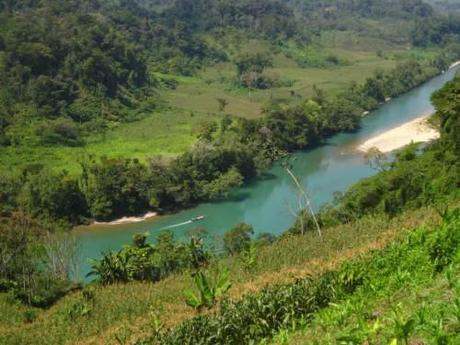
- Cultivated fields that would be flooded by the Xalalá dam. Photo: NISGUA
from NISGUA
Nearly two years after the Guatemalan government announced its renewed interest in constructing the Xalalá Hydroelectric Dam, communities maintain strong opposition to the project in the three affected municipalities: Ixcán, Uspantán, and Cobán.
The Xalalá Hydroelectric Dam was first proposed in the 1970s. Declared of “national interest,” it figured prominently in the Master Plan for National Electrification and the Northern Transversal Strip (FTN), a political-economic vision for land use, industrialization, and natural resource exploitation. If constructed, the Xalalá Dam would be the second largest hydroelectric dam in the country, producing an estimated 181 megavolts and flooding the lands of some 58 communities in three municipalities.
Community opposition consolidated after the 2007 community consultation held in the municipality of Ixcán, in which more than 90% of the population rejected the construction of hydroelectric dams such as Xalalá. In 2009, the municipality of Uspantán followed suit, holding a community consultation in which 90% of their population also rejected the construction of hydroelectric dams.
Despite the two referenda and strong community opposition to the project, the Xalalá Hydroelectric Dam continued to be a priority both for the Guatemalan government and for companies. Five months after the first referendum in 2007, the State opened bidding for the construction of the Xalalá Dam; one year later the bidding process was closed with no proposals received.
According to the Association of Communities for Development, Defense of Territory and Natural Resources (ACODET), “No civil servant speaks directly to the damages that communities will suffer; INDE announced the bidding processes as if the communities don’t exist. The communities’ position is not to reject something that would bring them benefits – the Xalalá Hydroelectric Dam would flood the best lands and lead to the disappearance of entire communities – it is supporting the right to life and the respect for lands which historically belong to them.”
In 2012, communities reported continued pressures from INDE’s developers, including the offering of development projects conditioned on accepting the dam and other tactics meant to divide the communities; attempts to coopt leaders, inviting them to attend private, all-expense-paid meetings; defamation of local groups and human rights defenders; defamation of information provided by ACODET; continual entrance of unknown persons into the area; helicopter flyovers; and even pressure on the local media, which has favored struggles in defense of territory.
In this context of mounting pressure, on October 18, 2013, INDE’s director of project development sent an invitation to community development committees (COCODEs) and social organizations in the area to attend a meeting in Guatemala City “to share experiences with the generation of clean energy”. Instead, communities proposed to carry out this meeting in the Ixcán region and in a format open to the public. On November 13, nineteen INDE representatives arrived in San Juan Chactelá, Ixcán, to present information to some 1,300 leaders and authorities from the affected communities and to hear their position.
This meeting took place after INDE had already signed a contract on November 7 with Brazilian Company Intertechne Constultores S.A. to carry out the geological assessment studies. This information was not shared at the meeting in Chactelá.
The more than 50 communities that would be affected by the construction of the Xalalá Dam continue to express their opposition to the project. The communities denounce the lack of consultation by INDE and highlight the numerous attempts by communities to obtain more information and communicate their opposition. It was not until November 2013 that INDE even attended a public meeting in the area. The affected communities demand that the State uphold their obligation to assure the right to health, food and a dignified life, and reiterate that these fundamental rights should not be conditioned on accepting the dam.

